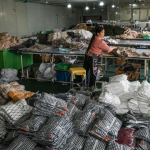The long-standing sluggishness of Samsung has added increased concerns to investors on whether the South Korean giant corporation will keep up with its smaller competitors, such as SK Hynix (000660. KS), opens new tab in their productions of high-bandwidth memory (HBM) components used in data centres related to artificial intelligence and distributed to customers such as Nvidia.
In October 2021, Samsung claimed that it was making headway in a significant sale to an undisclosed customer that industry analysts identified as Nvidia to provide HBM3E chips.
On Tuesday, Samsung declined to provide an update about the plan as it cautioned that HBM3E manufacturers have been ramping up the supply of chip supply faster than it can be consumed, a phenomenon that will influence pricing.
The technological powerhouse added that it is also a provider of HBM4 chip samples to customers, and they expect to provide it inunknown year later. Analysts also said that other customers of this chip include Nvidia.
On Thursday, Samsung said it was hopeful that the situation in the industry would change in the second half of 2022 and that demand in the AI chip segment would be fueled by investments made by the leading cloud service providers.
On Wednesday, Meta Platforms (META.O), opens new tab and Microsoft (MSFT.O), opens new tab cited healthy AI chip demand in their quarterly earnings reports and big investment in their data centres.
According to Samsung, there was also a certain worries regarding the slowdown of the global growth because of an uncertain trade environment and of geo-political risks.
Samsung Chief Financial Officer Park Soon-cheol said on Friday that the uncertainty has eased after negotiations between the United States and South Korea were resolved, putting an end to the trade dispute between the two countries.
Park said Samsung was watching the closely a U.S. national security investigation against imports of semiconductors, electronics including smart phones, tablets and personal computers, saying such investigation could deal a big blow to its businesses.
The revenue of Samsung in the second-quarter was up by 0.7 percent to 74.6 trillion won similar to the earlier estimate of 74 trillion won.
Its chip department earned 400 billion won in the quarter, compared with 6.5 trillion won one-year ago and that was the first time since the last six quarters that it was lower than the 1 trillion won tally.
In a statement, Samsung cited an inventory value change to the memory chips, as well as one off expenses due to the effect of U.S export restrictions on sales to China, as affecting the contract chipmaking division which reduced the earning of the division.
Samsung reported that smartphone demand which had recovered in the first half through hoarding of products to avoid the U.S. tariffs and Chinese subsidies will experience decelerated growth in the second half.
In case of TVs, Samsung anticipated that demand would decrease marginally because of inflation and weak financial conditions in the second half as compared to the previous year.
Samsung shares fell 1.8 per cent in early afternoon trade, a worse performer than the main index KOSPI (.KS11), opens new tab, which was down 0.5 per cent.















